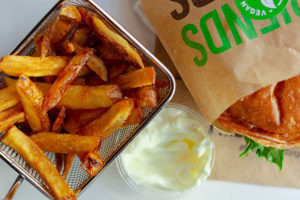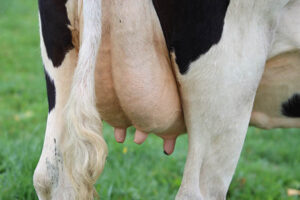By David Steele, President of Earthsave Canada
Insidiously it creeps, seemingly into most everything we buy. Killer palm oil sneaks into our lives. Vast swaths of rainforest are being razed to produce the stuff and the effects are terrible.
Tens of thousands of orangutans are dead because of it. Elephants, too. Sumatran tigers and who knows how many other wild animals have also succumbed and continue to succumb. Untold numbers of poor people have been evicted from their lands because of it, too.
And for what? Well, cookies, snack foods, granola bars, many baked goods. Margarines, peanut butters, too; even a few vegan cheeses. Palm oil is reportedly in about 40% of the foods in Canadian grocery stores. It’s also in soaps, shampoos, lotions, toothpastes. The good news is that it’s not in all of them.
It began innocently enough. Scientists discovered that a class of 20th century miracle compounds were not so good for us. Hydrogenated oils, i.e., trans fats – fats that store well and don’t turn rancid easily – were very bad for us indeed. These compounds – mostly non-existent in nature – are great at promoting heart disease and strokes. When alerted, the public rightly rose up. Hydrogenated fats had to go.
The problem was, though, that we’d become addicted to stuff and all of the processed foods it was rife in. Yup, those manufactured cookies, granola bars, margarine, etc., etc. And the companies that produce them were addicted to the low price of the stuff and the long shelf life that came with it. What were they to do?
Well, they had the answer. They were already using palm oil derivatives in their soaps, shampoos, moisturizers and the like. So, why not just substitute palm for the hydrogenated oils? The stuff ischeap, It keeps well. It satisfies our desire for fatty taste – all the better to keep selling the packaged foods to us. So, out went the trans fats and in went the palm oil.
Profits stayed high; people didn’t notice the difference. The companies were happy and so were the people. And, besides, the palm oil probably is marginally better for us, health-wise.
But it is absolutely terrible for the world. Palm oil is responsible for some of the most destructive deforestation in the world today. Friends of the Earth tells us that over two million hectares a year of rainforest are being chopped down each year for palm oil plantations. That’s two million hectares of homes for orangutans, elephants, tigers, native peoples. Because of it, wild orangutans may well be extinct within the decade.
Even worse than even this, palm oil is very probably accelerating global warming. Studies have found that palm oil-related destruction of rainforest and peatland is contributing enormously to global carbon emissions. Unchecked, this will kill far more life than is being directly harmed by the razing of rainforests – It is both deeply ironic and tragic that one of the biggest emerging markets for palm oil is for biofuels. Careful analyses of the evidence find it far better to keep burning fossil fuels – terrible as that realistically is – than to use palm oil to fuel our vehicles and homes. Clearly we can’t allow this to continue.
What Can You Do About It?
The good news is that palm oil is not everywhere. There are lots of products without it. Read your labels carefully. Avoid anything with palm oil listed. For good measure, avoiding palmitate and sodium lauryl sulfate makes sense, too. While they’re not necessarily made from palm oil, there is a good chance that they are.
To the extent that you can, skip the fatty processed foods. Palm oil can be hidden under the ‘vegetable oil’ label. There’s no way for you to tell. Bonus, it’ll be good for you: cutting back on fatty processed foods is very probably good for your heart.
Read your labels on household cleaners, soaps, shampoos, too. Our label reading indicates that many (but not all) Nature Clean products, for example, appear to be palm oil-free.
And to the extent that you can, cook for yourself. You’ll have a whole lot more control of what you’re eating then. One big sticking point is margarine. At this time there are no palm oil-free commercial margarines available. Fortunately, though, you can make your own. See the recipe highlighted in our newsletter. Or make the heart-healthy version Bryanna Clark Grogan has developed. Hers is at veganfeastkitchen.blogspot.ca
And don’t count on so-called “sustainable” palm oil to solve your problems. Greenpeace has looked extensively into the industry’s Round Table on Sustainable Palm Oil and found them to be anything but sustainable. As produced today, palm oil is one of the most destructive foods on the planet. Don’t eat it. Help put an end to this terrible story.
For more information, visit Say No to Palm Oil: www.saynotopalmoil.com



